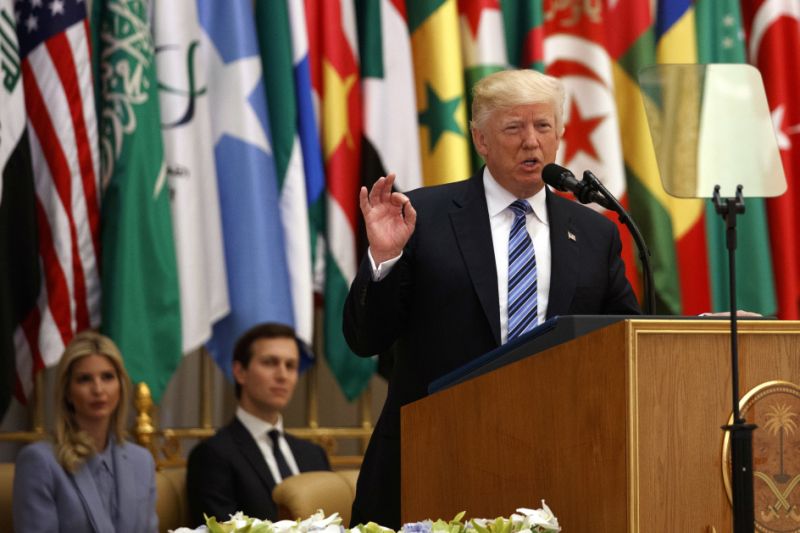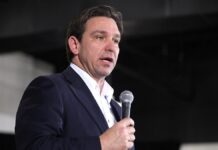President Trump kicked off his first presidential trip abroad by visiting Saudi Arabia, where he gave a speech Sunday to leaders from 50 Muslim countries about his vision for U.S.-Muslim relations. Trump is the only U.S. president to visit the Middle East on his first official trip overseas, and he used the occasion to talk about the great civilizational achievements of the Muslim world and the ways terrorism and Islamic radicalism have obstructed economic growth and prosperity in the region.
Then, he confronted these leaders with strong words about the unacceptability of coexisting with the violence radicalism brings: “There can be no tolerating it, no accepting it, no excusing it, and no ignoring it. Every time a terrorist murders an innocent person, and falsely invokes the name of God, it should be an insult to every person of faith. Terrorists do not worship God, they worship death.”
While Trump emphasized America’s commitment to fighting terrorism around the globe and with working with its allies, he also made it clear to the Muslim leaders gathered Sunday that America will only achieve limited success if these countries don’t take the initiative in the fight against radical Islam:
Terrorism has spread across the world. But the path to peace begins right here, on this ancient soil, in this sacred land. America is prepared to stand with you—in pursuit of shared interests and common security. But the nations of the Middle East cannot wait for American power to crush this enemy for them. The nations of the Middle East will have to decide what kind of future they want for themselves, for their countries, and for their children. It is a choice between two futures —and it is a choice America cannot make for you. A better future is only possible if your nations drive out the terrorists and extremists. Drive. Them. Out. Drive them out of your places of worship. Drive them out of your communities. Drive them out of your holy land, and drive them out of this earth.
Trump wants to make it clear that it’s the Muslim world, not the United States, that must lead the way in pushing back against Islamism. Part and parcel of that message is the fact that the United States isn’t going to bring democracy to the world as part of its counter-terrorism strategy—a significant departure from the Bush administration’s strategic efforts to establish democratic regimes in Iraq and Afghanistan. Trump repeatedly emphasized that the United States isn’t “here to lecture” or “tell people how to live.”
Our Job Isn’t to Colonize Your Politics or Minds
This echoes Secretary of State Rex Tillerson’s speech to the staff of the State Department earlier this month, during which he said the United States would not require countries to adopt American values before being willing to work with them. His remarks drew heavy criticism from the media and some former state department officials, who said the Trump administration is leaving American values on the ground.
Trump wants to make it clear that America is not in the business of making the world look like America. Although democracy might be within the grasp of some countries, and indeed beneficial to them, it cannot be forced from the outside. While reiterating America’s commitment to its allies in the region and to fighting Islamic terrorism, Trump said the United States will “seek gradual reforms—not sudden intervention.”
Trump’s comments are also quite a departure from President Obama’s 2009 Cairo speech, to which he invited members of the Muslim Brotherhood leadership against the wishes of the Egyptian government. Obama’s speech, panned by some as the kickoff of an “apology tour,” highlighted inclusivity and sent a message to the Muslim world that it was America, not Islamic extremism, that was at fault for terrorism. He drew comparisons between women’s rights in the Muslim world and America and compared the persecution of Jews over the millennia to the plight of the Palestinians today.
Trump, on the other hand, argued Sunday for the need for Muslim countries to ostracize and utterly reject the ideology that fuels Islamic extremism. He put the responsibility on them, not America, and, for the most part, called the problem by its name, although he did occasionally slip into using the Obama administration’s euphemistic language of “extremism.”
Many Foreign Leaders Find Terrorists Useful
Although there’s plenty in Trump’s speech to criticize—like his Bush-esque statement that we’re in a battle between “good and evil”—Trump is right that any lasting change must come from within the global Muslim community. That message must be repeated and reinforced. We cannot fight ISIS or the Taliban or prevent groups like them from rising up without the full cooperation of foreign governments or a real and significant change from within Islam’s various manifestations around the world.
But Trump might come to find that many of the leaders present at his speech in Saudi Arabia have more complicated relationships with terrorist groups and Islamist clerics than he realizes. Terrorists are sometimes used by leaders as helpful counterweights to other groups that threaten the ruling regime.
Syrian President Bashar al-Assad, for example, is alleged to have released from prison many of the radicals who formed the leadership of the Islamic State in Syria in 2011. That gave Bashar cover to claim the protests that were quickly developing into a civil war were, in fact, part of a terrorist insurgency, not an expression of the Syrian people’s desire for democracy.
Syria is an extreme example, but other countries have been known to do the same thing. One group of researchers recently published a study that found U.S. overseas missions to advise, train, equip, and assist foreign militaries often fail because “local leaders are typically more concerned with threats to their own rule from other elites within their state, especially a coup d’état from dissatisfied officers of militia leaders” than they are with external threats like ISIS.
Similarly, the support of powerful clerics, radical or not, is needed to retain power in many Muslim-majority countries. Whether we want to acknowledge it or not, clerics who promote what the West would consider fundamentalist or extremist Islamic views have large followings, and courting them is an imperative for some Middle East leaders.
In the end, many of the Muslim leaders Trump was exhorting in Saudi Arabia may be unwilling to take any significant action against the radicals in their countries, and even if they do, driving out terrorists and radicals could dangerously destabilize these regimes. Trump—and the American people—should be prepared for either scenario.





